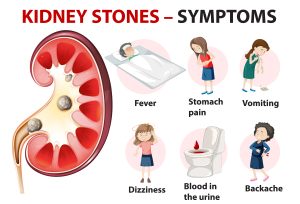The human body is a marvel of complexity, with its various systems working in harmony to maintain health and vitality. Among these systems, the kidneys hold a crucial role in filtering waste and excess substances from our bloodstream, preserving our overall well-being. However, when the balance within the kidneys is disrupted, the consequences can be painful and debilitating, leading to the formation of kidney stones. The good news is that there is a straightforward and accessible strategy to prevent kidney stones: hydration. In this comprehensive article, we will explore the essential relationship between proper hydration and kidney health, and how staying well-hydrated can be a formidable weapon against stone formation.
The Role of the Kidneys: Nature’s Filters
The kidneys are the body’s natural filtration system, responsible for removing waste products and excess substances from the bloodstream. In essence, they act as the body’s own waste management plant, processing around 200 quarts of blood each day to produce about 2 quarts of urine. This process helps maintain a delicate balance of minerals and fluids in our body.
Understanding Kidney Stones: A Painful Predicament
Kidney stones, medically known as renal calculi, are hard, crystalline structures that form within the kidneys. They are primarily composed of minerals and salts, with calcium oxalate being the most common constituent. Kidney stones can vary in size, from tiny grains to larger, more painful stones that can block the urinary tract.
The formation of kidney stones is a complex process, and several factors contribute to their development:
- Mineral Buildup: Excessive amounts of certain minerals, such as calcium, oxalate, and uric acid, can accumulate in the kidneys, creating the foundation for stone formation.
- Concentration of Urine: Dehydration or insufficient fluid intake can lead to concentrated urine, making it easier for minerals to crystallize and form stones.
Image by brgfx on Freepik - Genetics: Some individuals may be genetically predisposed to kidney stone formation, especially if they have a family history of kidney stones.
- Dietary Habits: High intake of oxalate-rich foods (e.g., spinach, beets, nuts) or excessive salt and animal protein consumption can increase the risk of stone formation.
Now, let’s explore the critical role of hydration in preventing kidney stones.
The Power of Hydration in Kidney Stone Prevention:
- Dilution of Minerals: Staying well-hydrated is a simple yet highly effective strategy for preventing kidney stones. Adequate hydration ensures that urine is less concentrated, making it difficult for minerals and salts to crystallize and form stones. Aim to drink at least 8 to 10 cups of water daily, and adjust your intake based on climate and activity level.
- Lemon Water Benefits: Citrus fruits, such as lemons and limes, contain citrate, a natural inhibitor of stone formation. Adding a squeeze of fresh lemon or lime to your water can increase citrate levels in your urine, reducing the risk of stone formation.
- Maintaining pH Balance: Proper hydration helps maintain a balanced pH level in your urine. An optimal pH level makes it less likely for crystals to form and grow, thus reducing the risk of kidney stones.
- Flush Out Toxins: Staying hydrated aids the kidneys in effectively flushing out waste and toxins from your body. This not only helps in preventing kidney stones but also contributes to overall kidney health.
- Combatting Dehydration: Dehydration is a significant risk factor for stone formation. When your body lacks sufficient fluids, it reabsorbs more minerals from the urine, making it easier for crystals to form. By staying well-hydrated, you reduce the chances of this happening.
Incorporating Hydration into Your Lifestyle:
- Set Reminders: In our busy lives, it’s easy to forget to drink water. Set regular reminders on your phone or use a water bottle with time markers to ensure you’re staying on track.
- Flavorful Hydration: If plain water doesn’t excite your taste buds, infuse it with slices of cucumber, mint, or berries. Herbal teas and natural fruit juices can also contribute to your daily fluid intake.
- Hydration with Meals: Make a habit of drinking a glass of water before each meal. This not only helps with hydration but can also assist in portion control.
- Monitor Urine Color: Your urine can be a helpful indicator of your hydration status. If it’s pale yellow, you’re likely well-hydrated. If it’s darker, it’s time to increase your fluid intake.
Conclusion: The Elixir of Kidney Health
Proper hydration is not only essential for overall well-being but also serves as a formidable defense against kidney stone formation. By understanding the relationship between hydration and kidney health, you can make conscious choices to keep your kidneys in optimal condition. Through a daily commitment to staying well-hydrated, you empower your body to maintain a delicate balance and reduce the risk of painful and debilitating kidney stones.

Remember, individual hydration needs can vary, so it’s essential to listen to your body and adjust your fluid intake accordingly. By making hydration a priority in your life, you’re not only preventing kidney stones but also promoting a healthier, more vibrant you.





